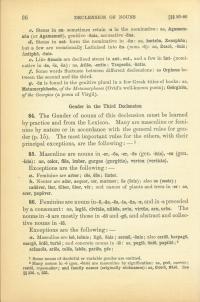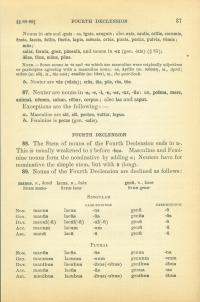84. The Gender of nouns of this declension must be learned by practice and from the Lexicon. Many are masculine or feminine by nature or in accordance with the general rules for gender (§ 31). The most important rules for the others, with their principal exceptions, are the following.1
85. Nouns in -or, -ōs, -er, -ĕs (gen. -itis), -ex (gen. -ĭcis) are masculine.
color, flōs, imber, gurges (gurgitis), vertex (verticis).
Exceptions:
a. The following are feminine.
Arbor, cōs, dōs, linte
b. The following are neuter:
Ador, aequor, cor, marmor, ōs (ōris)
also,
os (ossis), cadāver, iter, tūber, ūber, vēr
and names of plants and trees in -er.
acer, papāver
86. Nouns in -ō, -ās, -ēs, -is, -ūs, -x, and in -s preceded by a consonant are feminine.
legiō, cīvitās, nūbēs, avis, virtūs, arx, urbs
The nouns in -ō are mostly those in -dō and -gō, and abstract and collective nouns in -iō.
Exceptions:
a. The following are masculine:
leō, leōnis
ligō, -ōnis
sermō, -ōnisa
also,
cardō, harpagō, margō, ōrdō, turbō
and concrete nouns in -iō.
pugiō, ūniō, papiliō2
In addition,
acīnacēs, ariēs, celēs, lebēs, pariēs, pēs
nouns in -nis and -guis:
īgnis, sanguis
and
axis, caulis, collis, cucumis, ēnsis, fascis, follis, fūstis, lapis, mēnsis, orbis, piscis, postis, pulvis, vōmis.
Mūs is masculine, as are:
calix, fornix, grex, phoenīx
and nouns in -ex (gen. -icis) (see § 85 above).
Finally,
dēns, fōns, mōns, pōns.
Note— Some nouns in -is and -ns which are masculine were originally adjectives or participles agreeing with a masculine noun.
Aprīlis [sc. mēnsis] (m.) April
oriēns [sc. sōl] (m.) the east
annālis [sc. liber] (m.) the year-book
b. The following are neuter.
vās (vāsis)
crūs, iūs, pūs, rūs, tūs
87. Nouns in -a, -e, -l, -n, -ar, -ur, -ŭs are neuter.
poēma, mare, animal, nōmen, calcar, rōbur, corpus
Also lac and caput.
Exceptions:
a. The following are masculine.
sāl, sōl, pecten, vultur, lepus
b. The following is feminine.
pecus (gen. -udis)


